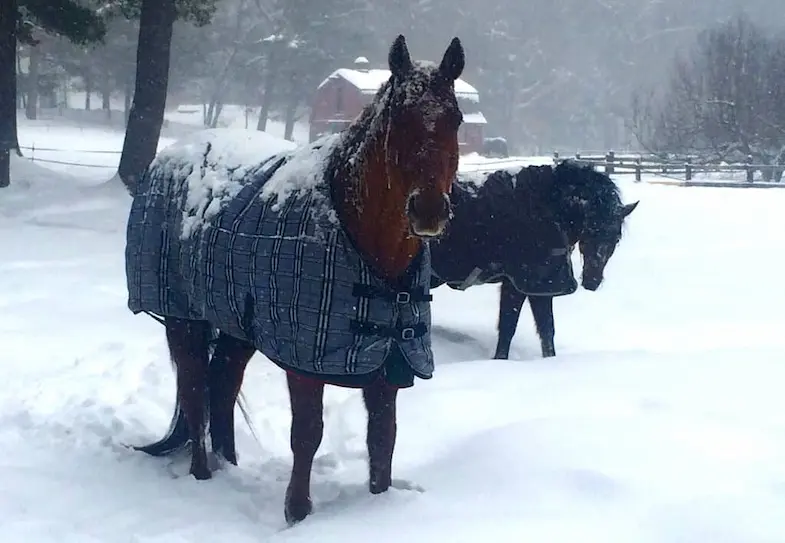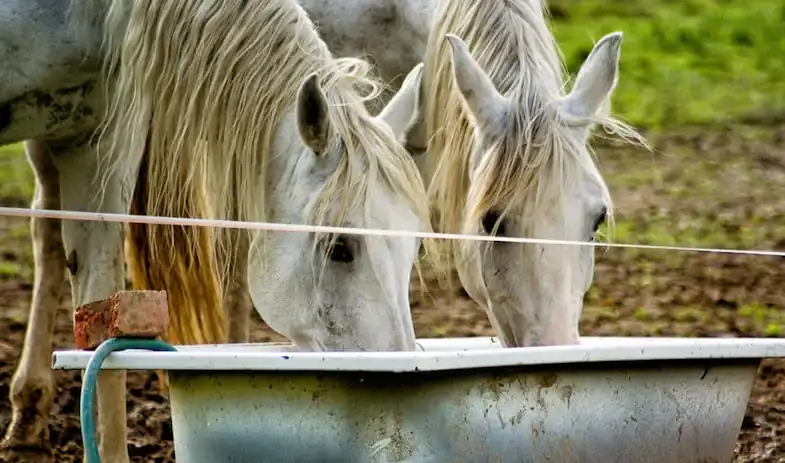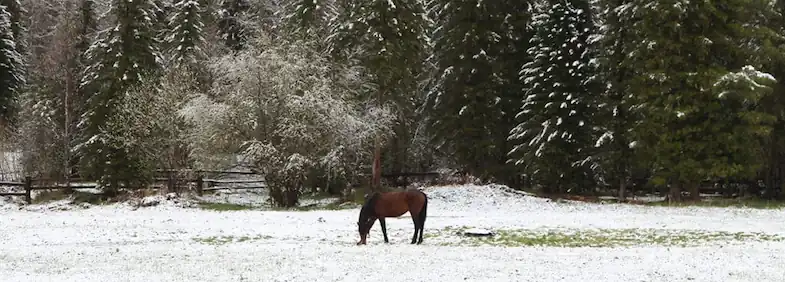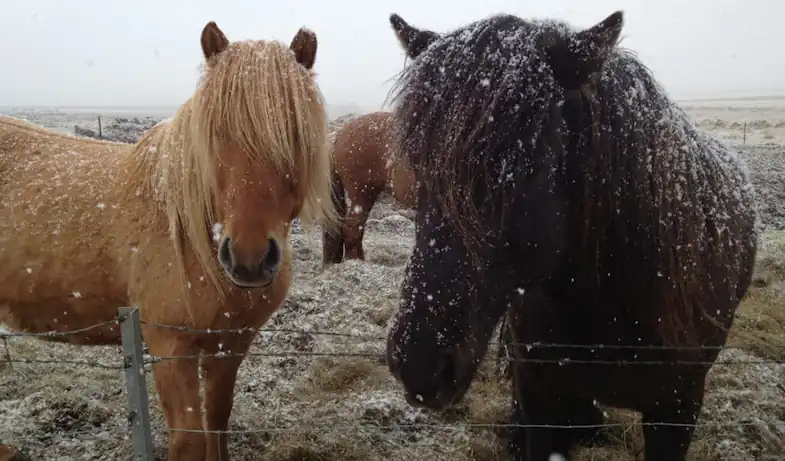It goes without saying that we all want the best for our four-legged friends but while covering them from head to toe in a quilted blanket may sound like heaven to us is it really want our horses want (or even need)? While we do share a number of similarities with horses but our ability to deal with the cold certainly isn’t one of them which is why we need to rethink how we look after our horses during the cold and often freezing, winter months.
Do horses get cold?
Horses, just like all mammals, will get cold when the mercury drops although that said they’re able to withstand far colder temperatures than you might think due to their hardy natures and thicker winter coats. Horses have a large thermoneutral zone which means there’s a wide range between when they’ll feel cold and when they’ll feel hot, our zone is between 77° and 95° Fahrenheit (25° and 30° Celsius) whereas a horse’s zone is between 32° and 77° Fahrenheit (0° and 25° Celsius).
That doesn’t mean to say that if the temperature goes below 32° Fahrenheit /0° Celsius your horse will automatically get cold, many horses grow thick winter coats in order to keep themselves warm and dry. Their coat does this by trapping warm air against the skin which helps to insulate it against the cold. Some horses also have a double-layered winter coat that will help to keep the wind out too.
Do horses really need blankets when it’s cold?
The jury’s still out on whether horses need blankets or rugs when the weather gets cold, some people will argue that as soon as we start to put extra layers on so should our horses but it isn’t always the case and can sometimes be the wrong thing to do. Because of their thick coats, a horse is able to hold heat better than we can so just because you’re cold it doesn’t mean that your horse is too.
Horses burn a lot of energy trying to keep warm but if they’re toastie warm under a blanket then they don’t need to do this but the energy needs to go somewhere and more often than not it’s deposited as fat as the horse starts to put on weight. They’ve also evolved to be able to cope with the cold and will automatically increase their metabolic rate when the weather gets really cold, they can also reduce the blood flow and temperature to their limbs so that their body keeps warm.
Many horses don’t need blankets at all unless the temperature drastically drops below freezing although a breathable, waterproof blanket can offer some protection against the wind and the rain.
If a horse is clipped and living outside though that’s another matter, depending on the type of clipping your horse will probably need a blanket when the temperature drops to between 41° and 50° Fahrenheit (5° and 10° Celsius), the same is true for older, younger and thinner horse too.
Can horses stay outside during the winter?
We automatically think that if the weather is cold its better to keep horses indoors, at least overnight, but while this is the best thing in some cases, in most it’s not necessary and your horse may even prefer to be outside. Horses are very well adapted to living outdoors and can manage temperatures far lower than we can, the thing that really bothers and upsets horses is the wind and the rain (and the snow) which is why a shelter is crucial.
If you are planning on keeping your horse outside during the cold weather then you need to consider the following:
Shelter
After food and water, shelter is the most important thing all horses need regardless of whether they’re living outside or stabled at night (after all a stable is a more luxurious shelter). Field shelters should be positioned so that they give protection on three sides and can shield your horse from the wind and rain (as well as the sun during the summer). It should also be big enough to allow all of the horses to use it at the same time or if not, there should be multiple shelters.
Calories
When the weather’s really cold horses will need to consume more calories than they do at other times of the year, the reason for this is in part because they’ll use the excess in calories to keep themselves warm. It’s important to make sure your horse has access to plenty of good quality, fresh and dry hay. If your horse is old or suffers from dental disease they have trouble chewing hay, if this is the case you might want to consider either a supplement or a feed that’s been developed specifically for senior horses.
Water
You might think that your horse won’t need as much water during the winter, especially if there’s snow on the ground, but this couldn’t be further from the truth. There are many more cases of impaction colic during the winter, caused by dehydration, which is why it’s important to make sure there’s plenty of drinkable water. Snow or ice won’t hydrate your horse at all but it will cause him to suffer from the cold much quicker. This is why you should think about having your horse’s water heated during the winter, you can use heated water tubs or non-freezing automatic watering systems as well as running electricity to the field to warm the troughs up there too. This will help to ensure your horse is drinking enough of the right sort of water.
Blankets
If your horse is blanketed during the winter you should remove the blanket to check your horse (and the blanket) daily. Blankets can hide any loss of weight so removing them regularly will prevent this from happening, doing this will also give you the chance to check the blanket and allow it to dry if necessary. When horses sweat and cool down bacteria can build up in the blanket – giving it a chance to dry and be cleaned will help to stop this.
Clipping
A lot of people think that you can’t clip a horse that’s turned out throughout winter but this isn’t always the case. If you do clip your horse during the winter then make sure you blanket him accordingly and that you regularly check if he’s cold, especially if he’s fully clipped; horses that are fully clipped can suffer from frostbite in exposed areas (such as their ears) so consider either investing in a head and neck blanket or hood to bringing him inside when it’s extremely cold.
Footing
Horses are generally very surefooted but when the ground is icy even the most confident and stable of horses can lose his footing and fall, resulting in sprains, cuts, and even broken bones. Of course, you can’t do anything about the weather but covering the ground in rock salt will help to reduce the amount of ice. If your horse is shod then you should also speak to your farrier about having snow pads fitted to stop snow building up in the shoes and destabilizing your horse.
How do I know if my horse is cold?
You can often tell if a person is really cold by their behavior and horses are no different, of course, you can use a thermometer to check their temperature but, understandably so, not all horses like that and you may not have one to hand so there are a few other simple ways to check if they’re cold.
Shivering
Like all mammals horses will shiver if they get really cold, it’s not the only reason that a horse may shiver but if the weather is cold and your horse doesn’t look comfortable then in most cases he’s shivering because he’s cold.
Tucked down tail
If your horse is nervous or stressed he may clamp his tail down against his body to try and hide himself as much as possible but this sort of behavior can also indicate that he’s cold. Checking your horse’s body temperature (you can do this with a rectal thermometer) will help you to determine if he’s cold or stressed.
Touch
Just because your horse is wearing a blanket it doesn’t mean that he’s warm and you should check regularly to see if he’s cold or not. You can easily do this by putting your hand under the blanket and feeling behind his withers, or around his shoulders and chest. Some people swear by checking a horse’s ears or legs but these aren’t a good judgment of overall body temperature, especially if they’re exposed to the elements.
What should I do if my horse is cold?
If your horse is cold you need to warm him by and make sure he stays warm, depending on how cold he is this shouldn’t be done too quickly. Start by putting a blanket on your horse, or an extra layer if he already has one and bringing him inside if you can. You should also make sure that his drinking water is warm too, otherwise, he won’t warm up because his core temperature (which should be around 100° Fahrenheit (38° Celsius) will remain cold.
Further reading
- Caring for your first horse
- How much space do horses need?
- How to care for a pregnant horse
- How to deal with fireworks
- Improving your horse’s confidence
- How to keep a horse alone
- How to prepare for a hurricane
- Equine influenza explained
- Treating ulcers naturally
- The facts about mud fever
I hope you found this article helpful. If you did I’d be grateful if you could share it please as it would really help me.
Recommended products
Over the years I have tried hundreds of different horsey products, from various blankets and halters to different treats. Some I’ve loved, others I’ve hated but I thought I’d share with you my top all-time favorite products, the ones I never leave the yard without. I’ve included links to the products (which are in no particular order) that I really think are great.
- Horse Knots by Reference Ready – If you’re like me and enjoy pocket reference guides then you’ll love this knot tying guide. These handy cards can easily fit in your pocket or attach to the saddle for quick reference. They’re waterproof, durable and are color coded to make them easy to follow.
- Mane ’n Tail Detangler – Even if you never show your horse you’ll need to detangle his tail from time to time (and possibly his mane too) which is always a challenging chore! I’ve found that if I run a little bit of detangler through my horse’s tails every few days it stops them from getting matted up and makes combing them easy, even if they’re coated in mud. I don’t know if I should admit to this or not but it also works wonders on my hair.
- TAKEKIT Pro clippers – Over the years I’ve tried a lot of different clippers and while some were obviously better than others I found these to be by far the best. They are heavier than a lot of other clippers but for me, that’s a good thing, it makes them feel more sturdy and hardwearing. On top of that they have a range of speeds so are just as good for clipping your horse’s back as they are his face. I also like the fact that they come in a handy carry case but that’s not for everybody. The company that makes them is super good and incredibly helpful too, a real bonus these days. The only thing I wasn’t keen on was the fact that it doesn’t come with any oil, but that’s not a major problem as it’s not difficult to buy lubricant.
- Shire’s ball feeder – There are so many boredom buster toys out there but I like to use these every day, regardless of whether or not my horses are bored. I find that it helps to encourage my horses to problem solve by rewarding them with treats (or pieces of fruit) but it also mimics their natural grazing behavior which helps to keep them calm and de-stressed.
- Horse safe mirror – This is a strange one that many people are surprised about but I like to put horse safe mirrors in the trailers as well as in the quarantine stalls. It helps to prevent the feeling of isolation by giving the impression of other horses being around. Being herd animals horses can get extremely stressed when they feel that they’re on their own but with these stick-on mirrors, they believe that at least one other horse is with them.
- Rectal thermometer – I know this isn’t glamourous at all but it’s vital for your horse’s well-being to be able to check their temperature and a rectal thermometer is the easiest way of doing this which is why I’ve added it to the list.
Shopping lists
I’ve also put together a few shopping lists of essential items that I’ve found helpful over the years. I’ve broken the lists down into different categories rather than put everything in one massive list 😉





